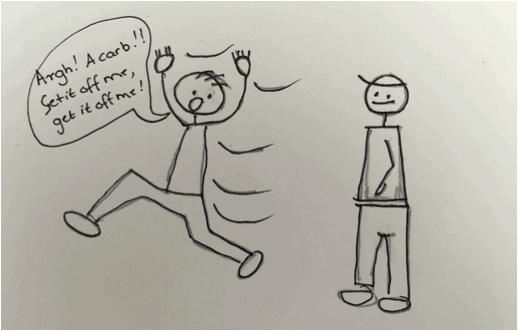Since when did we become so scared of food?

Have you noticed the language we use towards food?
Words such as ‘toxic’, ‘bad’, ‘clean eating’, ‘guilt-free’, ‘low carb/fat/sugar’, ‘quit’, ‘detox’ – the list goes on.
How did these words become a “normal” way to describe perfectly safe food? Unless there is a medically diagnosed reason, there is no reason to avoid or reduce consumption of whole food groups. I have clients come to my office, sit down and declare their confusion as to what food to eat or how exhausted they are with following strict diet regimes. I have also witnessed first-hand, how fear of food (expressed in the words listed above) have lead to eating-disorders, or in the least, disordered eating. And speaking with other dietitians, this is a concerning (and not uncommon) pattern.
Think about the trends over the years – first fats were demonised as the cause of our expanding waist-lines, then cholesterol, then saturated fat, then carbs, and now sugar is placed on the ever-revolving throne of disgrace. Sometimes I believe the nutrition panels on food packaging are the enemy of the food-fearing people – we focus so much on individual nutrients that we can’t see that the item is still just food. After all, since when do we go out with friends for a serve of 60g of carbs, 30g of protein, 15g fat and 8g dietary fibre when we are actually having pasta bolognese and salad?
This was recently demonstrated when a friend mentioned how sugar-laden grapes were – that this is comparable to a small handful of sweets. A cup of grapes and these sweets both have around the same amount of sugar but grapes are far superior nutritionally because they have the added benefits of water, vitamin C, potassium and dietary fibre. So while we may study the nutrition panels to compare the individual nutrients, it would be far wiser to bypass these panels and chose foods that nourish our bodies and we enjoy consuming.
And a little further on sugar – this is a nutrient that naturally occurs in our fruits, veggies and cereal-based foods for a good reason – we need it! We need it to fuel our central nervous system (brain and nerves) and provide energy at a cellular level for, well, everything we do. Some bloggers claim sugar is comparable to an evil dictator; however, sugar (as with any food or substance) only becomes problematic with overconsumption and after-all, overconsumption of water can be fatal too!
The language on food packaging is also cleverly devised, with various claims to sway the consumer i.e. ‘Low GI’, ‘Low Carb’, ‘No Sugar’, ‘High Protein’. Think about the amount of products for sale in the ‘health food’ section today compared to 20 years ago; there are more low fat/carb, high protein, sugar-free foods available now than ever, yet we are still becoming heavier as a nation and confusion around food is greater than ever. This clearly demonstrates that it is not the food that is the problem, but more our disharmonious relationship we have with food. I have also witnessed first-hand that some people become so scared of particular food items, that it often becomes their binge food, leading to overconsumption, guilt and regret.
By accepting that all food is (morally) equal and being confident that no one type of food can harm us internally – yes, not even the indulgent, pleasure foods – we give ourselves the chance to consume food with enjoyment and without the cycle of overconsumption guilt and regret.
So how does this shift to food acceptance happen? Well, certainly it is unlikely to happen over night, but a great step to start with is to be aware of the social media influences that demonise staple food groups or make us feel less-than-perfect because we don’t sport the perfect body size or shape. Ask yourself – Who do I follow on social media?
- Where is the proof to their claims and what language do they use?
- What pages do I read on the internet and what effect do they have on my relationship with food and my body?
- What books have I bought in the ‘health’ section? How do these leave me feeling about food?
- How does advertising on radio or TV (regarding body weight loss, food trends) effect me?
Take a moment to become aware of these influences and their effect on you, this will be one liberating step in the right direction.
Food fear is something that we can either be unwittingly lead into, or we can choose to identify the triggers that lead us to fear food. We CAN learn to accept that all food is all OK, and that consuming foods from all food groups is healthy both mentally and physically.
So, let’s embrace and enjoy all foods and move away from fearing it – just imagine what an enjoyable place that would be!
Angela Tremayne – love what you eat dietitian
